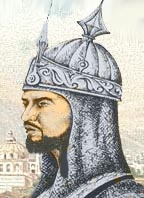Ashraf Khan
Ashraf Khan († 1729 ) was a ruler from the Hotaki dynasty . The Hotakis had rebelled against their overlords, the Safavids and then ousted them in 1722. Ashraf Khan was a Pashtun from the Ghilzai tribal federation who ascended the throne in 1725 after the death of Mir Mahmud Hotaki. He was a nephew of Mir Wais Hotak and during his reign the Hotaki Empire quickly fell under pressure from the Ottomans , the Russian Empire and the Persian Resistance.
But Aschraf resisted the attacks of the Russians and the Ottomans. The Ottomans were defeated in a battle near Kermanshah , even though they were only a few kilometers from the capital, Isfahan . The defeat led to negotiations with the Sublime Porte , which were only briefly interrupted because Ashraf's representative insisted that he should be the Caliph of the East and the Ottoman Sultan Caliph of the West . This annoyed the Ottomans a lot, but in the end a treaty was signed in Hamadan in September 1727.
In the end, Nadir Qoli Beg - later better known as Nadir Shah - defeated Ashraf Khan in the Battle of Damghan in late September 1729 and drove him from Persia to the east. During the retreat, Ashraf Khan was murdered by a Baloch tribesman. This was possibly on the orders of his cousin, who then ruled Kandahar .
His death marked the end of the Hotaki dynasty, but this was only a brief episode before the independent Pashtun kingdom was established. This Durrani empire was the forerunner of the state of Afghanistan .
See also
Individual evidence
- ^ Encyclopaedia Britannica - The Hotakis (from Afghanistan) Link
Web links
- Ashraf Khan . In: Ehsan Yarshater (Ed.): Encyclopædia Iranica (English, including references)
- Last Afghan Empire. AfghanSite.com, accessed December 10, 2008 .
| personal data | |
|---|---|
| SURNAME | Ashraf Khan |
| BRIEF DESCRIPTION | Ruler from the Hotaki dynasty in Persia |
| DATE OF BIRTH | 17th century or 18th century |
| DATE OF DEATH | 1729 |
